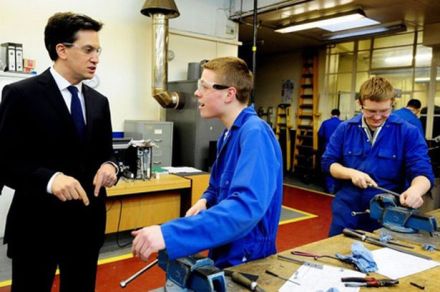This summer marked the seventieth anniversary of Rab Butler’s 1944 Education Act receiving Royal Assent. And with the introduction of free schooling for all to 15 and the massive expansion of education to the working classes that ensued, there can be little argument it represents a pivotal moment in our country’s history. Yet in one crucial way the act can be seen as a victory from which English education has yet to recover. Because just as the British in Berlin were laying the foundations of German’s superb system of post-war technical education, back here in Blighty we were shooting ourselves in the foot. Even at their height technical schools – the third plank of Butler’s tripartite schools system – failed to cater for more than 2% of pupils. From this stems the historic failing of English education – a shocking inequality of opportunity between technical and academic routes.
Unsurprisingly, the Tories have continued this damaging neglect. At no point has this government come close to providing a strategy for spreading opportunity to the ‘forgotten fifty percent’ of young people who do pursue the traditional school-based route to university. However, no task is more crucial for social justice and economic competitiveness in the 21st century. We need to train around 50,000 high-skilled technicians a year just to meet the needs of an aging workforce – let alone expand the economically critical science, technology and engineering sectors. What is more, studies have repeatedly shown that those countries which do enjoy a strong technical education route – such as Austria, Germany and Switzerland – have battled the scourge of youth unemployment far more effectively.
In contrast, the next Labour Government will finish the business of Butler. We are committed to working with schools, businesses, further education colleges and universities to provide an education and skills system that maintains a rigorous focus on vocational excellence. That begins with all pupils studying English and Maths till 18 and a 16-19 Technical Baccalaureate qualification delivered by new Institutes of Technical Education. And it ends with Technical Degrees to provide a vocational gold standard for young people to aspire towards.

However, most vital of all is what happens in between. And the truth is our current apprenticeship system is nowhere near up to scratch. Fewer than 1 in 10 British employers currently offer apprenticeships, two thirds of which are at a standard our international competitions would not recognise. Meanwhile, under the Tories the integrity of what it means to be an apprentice has been cheapened by the widespread repackaging of low-level workplace training. Nearly 70% of apprentices are existing employees with far too few opportunities being given to young people.
Labour will radically reform our apprenticeship system, moving towards a system where all apprenticeships are level 3, last at least two years and focus on new job entrants not existing employees. Our ambition is that by 2025 this country will be sending as many young people on high-quality apprenticeships as we do to university.
Make no mistake: this is a tough, transformative reform with the potential to reshape our economy as well as our education system. Right across the country there are communities struggling to secure their pride, prosperity and place in an increasingly competitive world. But Ed Miliband’s crucial insight is that our broken economic model – with its poverty pay, zero hours, low-skilled work and cost-of-living crisis – is holding Britain back. We need to earn our way towards a fairer society and stronger economy by creating more high-skilled, high-wage jobs. That begins with a modern apprenticeship system fit for the 21st century – a task, like so many highlighted this week, that only a 2015 Labour government can achieve.
Tristram Hunt is the Shadow Education Secretary




More from LabourList
‘Labour’s quiet quest for democratic renewal’
‘Labour promised to make work pay. Now it must deliver for young people’
‘Council Tax shouldn’t punish those who have the least or those we owe the most’